Virtuosity is a hybrid monster, a veritable Frankenstein’s monster stitched together from various ideas and concepts you’ve seen done elsewhere and better. In a way, it feels like the logical combination of Hollywood’s fascination with two nineties genres that the studios never really understood. One part cybernetic internet-era technological thriller to one part serial killer movie, Virtuosity feels like a volatile cocktail that needs to be handled with care. If there is a way to work this curious blend of genres, it’s with a very delicate and nuanced. Unfortunately, neither Eric Bernt’s script nor Brett Leonard’s direction can really make anything of what should at least be a pulpy premise. Russell Crowe does do an excellent job as the cybernetic serial killer, though.
Arguably the worst thing about Virtuosity, which is a loud self-contradictory mess of themes and ideas drowned out by ill-considered production design and very dated nineties effects, is just how average all the elements are. It seems like the movie lacks even the vitality to turn into some grand camp failure, and instead has no real ambition to speak of whatsoever. The plot, the characters and the setting, along with all the other ingredients, seem to come pre-packaged and delivered in a manner that would be offensively dull if it weren’t so incredibly lifeless.
Denzel Washington plays a cop, who is also a criminal. Unfortunately, the script seems to think that this rather tried-and-tested plot point serves to add some depth to the character, ignoring that it isn’t nearly strong enough to define him. He has a shady past, and the requisite emotional angst to colour his interactions with the psychopathic synthetic SID 6.7. And, of course, the interaction between the pair inevitably becomes personal because, you know, if you’re making a movie about a killer artificial intelligence, you wantit to seem like every other cop-and-robber film on the market. You wouldn’t want the audience to think there’s something different, would you?
Washington seems to search idly for something resembling a character in the collection of clichés that make up the lead role, but never quite succeeds. Washington is a great actor, and – I’d argue – one of the great leading men of the past twenty or thirty years. If he can’t find something of interest in his role, I tend to blame the script. Washington spends the first half-hour trying to breath life into his role, but seems to give up around the half-way point.
While Washington tries to make it through the film with his dignity intact – but without seeming too aloof or disinterested – then Russell Crowe opts to go completely all-in. Crowe’s performance is the closest thing that Virtuosity has to a pulse, a sign that it isn’t clinically dead on arrival. The script is less than kind to the character, and Crowe is stuck delivering lines like, “In the world you live in, the God who created you giveth and he taketh away. But in my world, the god who created me doesn’t have any balls.”But he does so with aplomb.
You’d imagine it would be quite difficult to make a serial killer artificial intelligence boring. After all, cinema is populated with tonnes of iconic psychopathic machines, and there’s always something fun about something that looks human but isn’t underneath. Unfortunately, that’s not the case. SID 6.7 is an artificial intelligence designed to test potential law enforcement recruits. SID 6.7 is also a concept created in the most mundane manner possible. Apparently the act of producing a psychopathic robot consists of dumping a bunch of serial killer personas into a computer and then standing back and popping some corn.
Apparently SID 6.7 is the product of some of the most evil minds who ever lived. Naturally, that includes Hitler and Charles Manson, because you don’t want to confuse the audience. Let’s discount that serial killers each tend to have their own pathologies, so “mix and match” doesn’t really make much sense. Let’s also ignore that fact that Hitler would probably be disappointed that the best his psyche in a robot body could do is shoot some people. Looks like robot!Hitler’s brain lacks ambition, or has learnt to settle.
Of course, these ideas would challenge the notion that putting bad things together in a melting pot of other bad things must inevitably produce one unified very bad thing, and so it’s never really brought up. Instead, SID 6.7 makes one reference to Charles Manson (which, we’re told, establishes him as a copycat) and then goes off to do his own sort of thing. Which might be interesting, if the movie explored the idea. Can SID 6.7 evolve? He can improvise and exploit his programming, but can he transcend himself? After all, SID 6.7 was designed to be a perfect killing machine, so is it fair to hold him morally responsible for doing what he was built to do? At what point does free will exist, if at all? However, these ideas would get in the way of cop chases bad guy action!, so they fall by the wayside.
Still, the movie’s best scene features SID 6.7 taking hostages in a nightclub to compose a symphony literally composed of the sounds of human suffering. It’s a nice showcase for the soundtrack, which involves Peter Gabriel, and it’s a neat gimmick – but it doesn’t go anywhere. A better movie would make it a thematic point – the idea that SID 6.7 could create in his own right, in his own sick way. Instead, it seems like a cheap attempt to look for a sleazy gimmick, a “hook”for this psychotic. Gabriel’s score and Crowe’s performance make the sequence work much better than it should.
There are also very vague hints that the movie could have been a lot better, as it begins to broach ideas about violence in the media, only to veer off radically whenever it seems like it might say something. There are snippets of dialogue here and there that suggest the film might interested in how the media portrays violence, and how the public responds to it. “Would you mind saying your signature phrase?” a reporter asks Grimes, the man holding a wife and child hostage to taunt his pursuers. He smiles, wryly, as if delivering his catchphrase. “Parker, this one’s for you.” It feels a little shallow, awkward, superficial and forced.
Interviewing the terrorist, the reporter comments, “To a surprisingly large number of your supporters, you’re a hero.” This seems like a relatively decent commentary on the difference between a terrorist and freedom fight, the attempt to portray violence as inherently subjective and even justifiable. However, read the line itself. It makes no sense. Of course a “large number” of his “supporters”consider him a hero. They would not be his supporters if they didn’t.
Similarly, the climax of the film sees SID 6.7 hijacking a television station to broadcast “Death TV.” The ratings seem to skyrocket. It could be a wry commentary on the public’s fixation with violence, but it just seems like a quiet nod in the direction of social commentary. (As does, for example, the use of prisoners as guinea pigs for the virtual reality system.) The movie is never interested with engaging with any of these points, and so it all feels like worthless padding, an attempt to earn brownie points for something that the movie never did.
If Eric Bernt’s script feels like a wasted effort, Brett Leonard’s direction is positively depressing. There’s no energy or spark to the film. The cutting is a mess. The humour is terrible. Even Crowe’s performance seems to struggle against the editing and the direction of the film. At one point, Leonard even makes a Stayin’ Alive gag. In a film made in 1995. That said, there is one nice shot, as SID 6.7 talks to his creator, with his monitor zooming in on his face as the camera zooms out. The effect is that Sid 6.7’s head remains one constant in a scene that shifts – it’s a rare moment where SID 6.7 seems more real than the world around him, and the movie could have done with more of that.
Virtuosity is a disappointing mess. It’s not even brave enough to end up being truly, entertainingly bad. It’s just soul-destroyingly bland. And that, in a way, is almost worse.
Filed under: Non-Review Reviews | Tagged: Brett Leonard, Caesars Palace, Charles Manson, classical music, denzel washington, Eric Bernt, history, hollywood, Janitor, Ludwig van Beethoven, murder, Piano, russell crowe, serial killer, Sid, SID 6.7, The Great Kat, Virtuosity |















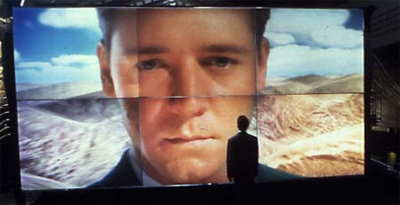
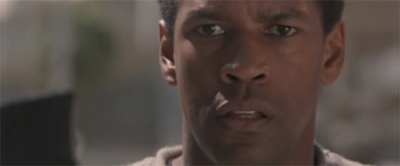

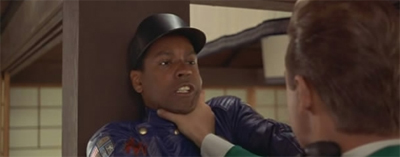
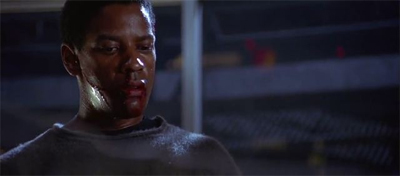

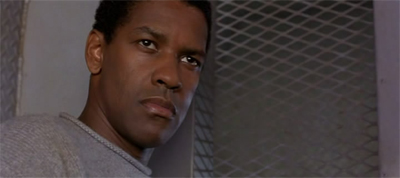





I love computer oriented movies from the ’90s. Hollywood has never caught up with technology or understood it much. Movies like this, “The Net,” and “Lawnmower Man” prove that writers and directors had heard the word “computer” and then made up magic powers that computers could supposedly do. You can put your brain on hold and suspend disbelief, but only if the movie is good. Most of these are not.
Yep, it’s funny to look back at what we thought computers would be doing in the next twenty or so years. I’m just disappointed my PC doesn’t communicate to me in streaming green code.
At least with all-in-one computers, we can now legitimately have a scene where someone shoots a monitor and destroys the CPU.
And I can set the colour of the font in my Unix window and rotate the screen so I get green streaming code!